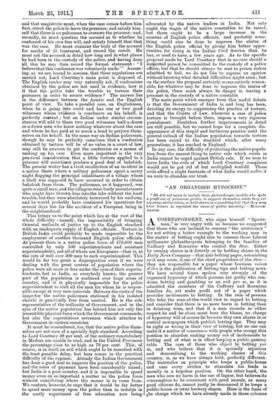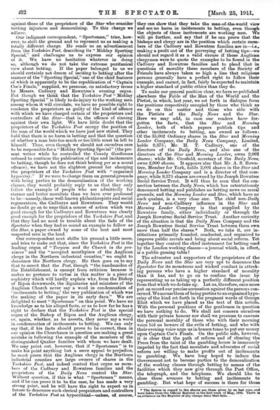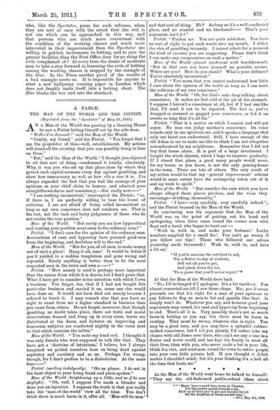"AN ORGANISED HYPOCRISY."
"He did not mean to imitate those philanthropic models who i(nke a profit out of poisonous pickles to support themselves uhile they ar• exposing adulteration, or hold shares in a gambling hell that they may have leisure to represent the cause of public morality."—MIDDL1- ACORRESPONDENT, who signs himself " Sports- man," is very angry with us because we suggested that those who are inclined to censure " the aristocracy " for not setting a better example to the working man in the matter of betting ought also to censure those Liberal millionaire philanthropists belonging to the families of Cadbury and Rowntree who control the Star. Either by owning shares in it directly or by holding shares in the Daily News Company—that anti-betting paper, astonishing as it may seem, is one of the chief proprietors of the Star— they are responsible for a paper whose business raison d'être is the publication of betting tips and betting news. We have several times spoken very strongly of the organised hypocrisy of which persons are guilty who con- demn betting and gambling as an evil per se, as it is admitted the members of the Cadbury and Rowntree families do, yet make profit out of a paper which provides incitements to betting. In the case of persons who take the man-of-the-world view in regard to betting and consider that there is no more harm in betting than in drinking wine, and that if a man exceeds in either respect he and he alone must bear the blame, no charge of hypocrisy will of course lie because they own shares in or control newspapers which publish betting tips. They may be right or wrong in their view of betting, but no one can make it a matter of conscience with people who occupy this position to abandon making money out of incitements to betting and of what is in effect keeping a public gaming table. The case of those who object to betting per se, and who believe that it is specially injurious and demoralising to the working classes of this country, is, as we have always held, perfectly different. The teetotaller on principle who keeps a public-house and uses every artifice to stimulate his trade is morally in a hopeless position. On the other hand, the man who sees no harm in the use of liquor, but believes its consumption to be consistent with good morals, as many good citizens do, cannot justly be denounced if he keeps a public-house or owns brewery shares. Here is the basis of the charge which we have already made in these columns against those of the proprietors of the Star who consider betting injurious and demoralising. To this charge we adhere.
Our indignant correspondent, " Sportsman," tries, how- ever, to shift the ground and to represent us as making a totally different charge. He sends us an advertisement from the Yorkshire Post, describing its " Midday Sporting Special," and challenges us to express our opinion of it. We have no hesitation whatever in doing so, although we do not take the extreme puritanical view about betting. If the paper belonged to us we should certainly not dream of inciting to betting after the manner of the " Sporting Special," one of the chief features of which is apparently to be the republication of " Captain Coe's Finals," supplied, we presume, on satisfactory terms by Messrs. Cadbury and Rowntree's evening organ. But though we think that the Yorkshire Post " Midday Sporting Special" is likely to do injury to the working men among whom it will circulate, we have no possible right to condemn the proprietors as guilty of the kind of offence with which we have charged certain of the proprietors and controllers of the Star—that is, the offence of sinning against their own light. We have little doubt that the proprietors of the Yorkshire Post occupy the position of the man of the world which we have just now stated. They hold that there is no harm in betting and that the question of whether a man bets too much or too little must be left to himself. Thus, even though we should not ourselves care to be responsible for a "Midday Sporting Special" (the pre- sent writer while he controlled. the County Gentleman refused to continue the publication of tips and incitements to betting, though he does not think betting per se a moral offence), we have not the slightest ground for charging the proprietors of the Yorkshire Post with " organised hypocrisy." If we were to charge them on general grounds with being parties to the demoralisation of the working classes, they would probably reply to us that they only follow the example of people who are admittedly far sterner and better moralists than we have ever professed to be—namely, those well-known philanthropists and social regenerators, the Cadburys and Rowntrees. They would no doubt go on to urge that a course of action which was good enough for the Cadburys and Rowntrees was clearly good enough for the proprietors of the Yorkshire Post, and that they had no need to trouble about the fads of the Spectator when they had so sound an example to follow as the Star, a paper owned by some of the best and most respected men in the land. Our correspondent next shifts his ground a little more, and tries to make out that, since the Yorkshire Post is the leading organ of " Toryism and the Church in the pro- vinces" and the " accepted mouthpiece of the Anglican clergy in the Northern industrial counties," we ought to denounce the Northern clergy. He then goes on to say that to assert that the Post, though "the handmaiden of the Establishment, is exempt from criticism because it makes no pretence to virtue in this matter is a piece of sophistry which will hardly explain why, from the Bishop of Ripon downwards, the dignitaries and ministers of the Anglican Church never say a word in condemnation of ' incitements to betting,' the very publication of which was the making of the paper in its early days." We are delighted to meet " Sportsman" on this point. We have no knowledge as to his alleged facts, or as to how far he has a right to declare that the Yorkshire Post is the special organ of the Bishop of Ripon and the Anglican clergy, or, again, whether, as he asserts, they never say a word in condemnation of incitements to betting. We can only say that, if his facts should prove to be correct, then in our opinion the Churchmen in question are making a great mistake in following the example of the members of the distinguished Quaker families with whom we have dealt. We may point out, however, that if " Sportsman" is to make his point anything but a mere appeal to prejudice, he must prove that the Anglican clergy in the Northern industrial counties are large owners of shares in the Yorkshire Post, and indeed control that organ as mem- bers of the Cadbury and Rowntree families and the proprietors of the Daily News control the Star. Without question, if this is what " Sportsman " means, and if he can prove it to be the case, he has made a very strong point, and he will have the right to expect us in future to denounce such clerical proprietors and controllers of the Yorkshire Post a8 hypocritical—unless, of course, they can show that they take the man-of-the-world view and see no harm in incitements to betting, even though the objects of these incitements are working men. We will go further, and say that if he can prove that the bishops and clergy are in the position which certain mem- bers of the Cadbury and Rowntree families are in—i.e., making a profit out of the purveying of betting tips—we should notregard it as a valid excuse if those Anglican clergymen were to quote the examples to be found in the Cadbury and Rowntree families and to plead that in questions of morality these members of the Society of Friends have always taken so high a line that religious persons generally have a perfect right to follow their example, and cannot, in fact, fairly be expected to maintain a higher standard of public ethics than they do.
To make our general position clear, we have re-published elsewhere the Fable of the Man of the World and the Pietist, in which, last year, we set forth in dialogue form the positions respectively occupied by those who think as we do on this matter and those who side with the Pietists of the Daily News and the Star. Here we may add, in case our readers have for- gotten the facts, that the Star and Morning Leader, both of which papers publish tips and other incitements to betting, are owned as follows: Of the 35,002 Ordinary shares in the Star and Morning Leader Company, the Daily News Company, Limited, holds 9,375; Mr. H. T. Cadbury, one of the directors of the Daily News, and also one of the directors of the Star and Morning Leader, owns 2,001 shares ; while Mr. Crosfield, secretary of the Daily News, owns 2,000 shares. It appears also that Mr. A. S. Rown- tree, Member for York, holds 2,001 shares in the Star and Morning Leader Company and is a director of that com- pany, while 9,375 shares are owned by the Joseph Rowntree Social Service Trust. It will thus be seen that the con- nection between the Daily News, which has ostentatiously denounced betting and publishes no betting news on moral grounds, and the Morning Leader and Star, which have na such qualms, is a very close one. The chief non-Daily News and non-Cadbury influence in the Star and Morning Leader Company is that supplied by the Rowntree family, either individually or through the Joseph Rowntree Social Service Trust. Another curiosity of the situation is that the Daily News Company and the Joseph Rowntree Social Service Trust between them own more than half the shares.* Both, we take it, are in- stitutions primarily founded, conducted, and organised to improve public morals and bring about social reform. Yet together they control the chief instrument for betting used by the London working classes—a journal which, in effect, is a public gaming table !
The advocates and supporters of the proprietors of the Daily News and the Star are very apt to denounce the Spectator for its monstrous and wicked conduct in attack- ing persons who have a higher standard of morality than it has, and to go on to confuse the issue by representing us as taking up a perfectly different position from that which we do take up. Let us, therefore, once more put on record our precise accusation against the persons con- cerned. We accuse them of being parties to an organised hypo- crisy of the kind set forth in the pregnant words of George Eliot which we have placed as the text of this article. With the personal positions of the gentlemen in question we have nothing to do. We shall not concern ourselves with their private honour nor shall we presume to canvass the personal morality of those who with their morning voice bid us beware of the evils of betting, and who with their evening voice urge us in brazen tones to put our money upon Captain Coe's Finals. On the public side, however, it is clear that the path of reform and of clearing the Press from the taint of the gambling house is immensely impeded by the fact that moralists and advocates of social reform are willing to make profits out of incitements to gambling. We have long hoped to induce the Government not to become parties to the demoralisation of the working classes through betting by means of the facilities which they now give through the Post Office, the telegraph, and the telephone. We should like to close those avenues to betting and incitements to gambling. But what hope of success is there fOr those • The figures in regard to the shares are those given by us last year, and were taken from the Official Register in the first week of May, 1910. There j111
no etiaence on the Register of any change since that date. - •
who, like the Spectator, press for such reforms, when they are met at once with the retort that the evil is not one which can be approached in this way, and that persons who are much more conversant with the condition of the working classes and much more interested in their improvement than the Spectator are willing to publish incitements to betting, and to give far greater facilities than the Post Office does for pu shing the evils complained of ? At every turn the desire of moderate men to take a step forward in lessening the evils of betting among the working classes is stopped by the example of the Star. In the Press another proof of the results of a bad example meets us. It is impossible for anyone to start a new halfpenny evening paper in London which does not frankly make itself into a betting sheet. The Star blocks the way and sets the standard.












































 Previous page
Previous page